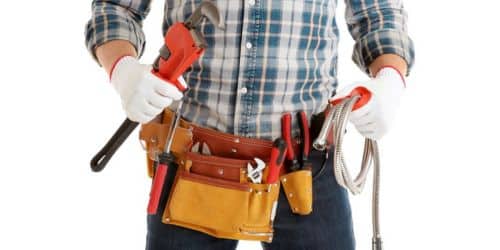According to the Bureau of Labor Statistics, plumbers will continue to enjoy favorable employment prospects until the year 2029 (and perhaps beyond). Starting a business in this area is a prudent move. You can get by as a plumber without a plumbing license if you’re willing to learn from an experienced master plumber, but a plumbing license will provide you with more opportunities to advance in your career. Read further to get to see how to get a plumbing license and the requirements. We also added how to go about the plumbing license test. Enjoy the ride!
The Plumber’s Job
Professional plumbers are trained to complete a wide range of plumbing services for both residential and commercial properties. Pipe and fixture designers, installers, and fixers are plumbers. To set yourself apart from the competition, you could choose to focus on a specific aspect of plumbing systems.
What Does a Plumber Do?
Professional plumbers are needed in both commercial and residential properties to set up and maintain systems for delivering and treating water and gas, as well as heating and plumbing components. They check plumbing systems for compliance with building codes and design new systems accordingly. They frequently drive large or short distances on their own accord to make the required repairs, and they often operate alone. Plumbers may also be required to install fixtures like toilets, sinks, bathtubs, and other similar items. A plumber’s responsibilities include:
- Assessing and fixing plumbing problems on-site at homes and businesses
- Estimating repair costs before beginning work
- Identifying problems and suggesting workable solutions
- Planning new builds by studying and deciphering blueprints.
- Pipelining and related fixture installation
- To locate and identify problems by means of specialized testing equipment.
- Fixing a wide range of plumbing fixtures and equipment
- Processing, assembly, and welding of tubing, pipe, and fittings
- Assuring that every work complies with relevant codes and standards
How to Become a Plumber
There are a number of things you may do to become a plumber, in addition to learning the fundamentals like communication, math, and customer service. The following are the steps you need to take to become a plumber:
#1. Get Your High School Diploma or GED
A high school diploma is required for entry into the plumbing industry, however, those who are still in school but have completed the necessary coursework can also enter the field. A GED is an option for those who do not have a high school diploma. Expertise in a wide range of disciplines, including science, technology, computers, and mathematics, is necessary for a successful plumbing career. Consider enrolling in drafting courses if they are offered at your institution.
#2. Complete Vocational Training for Plumbing
Though a four-year degree isn’t necessary to enter the field of plumbing, persons interested in the field often undergo extensive practical training. In order to become certified in plumbing, you can take classes at a technical college or trade school that focus on drainage systems, water, and the proper use of piping equipment.
#3. Serve an Apprenticeship in the Plumbing Trade
You might decide to become a plumber after finishing your formal education. Apprenticeship programs typically have a minimum number of classroom hours before an applicant is considered. The precise time commitment is typically associated with certain apprenticeship programs. Apprenticeships in the plumbing industry can provide valuable on-the-job training in addition to classroom instruction in plumbing codes, standard operating procedures, and advanced techniques.
#4. Get Your License
A plumbing license is necessary in many jurisdictions. Getting a plumbing license typically requires a certain number of hours of classroom training, practical experience, and an apprenticeship, followed by a licensing exam. A plumber’s competence and familiarity with relevant regulations and practices are tested here.
#5. Gain Experience
After passing the necessary exams and receiving your plumbing license, you can go further in your plumbing career. You can further your professional prospects by acquiring marketable skills and knowledge through formal education. There is room for advancement into the position of a master plumber, which offers better compensation and perks.
Plumbing License
In the United States, plumbers have among the strictest licensing requirements. And if you’ve ever watched a do-it-yourself home renovation show on television, you already know why. Plumbers, like electricians, are required by law in most areas to hold a plumbing license proving they satisfy certain standards. The exams and standards for obtaining a plumbing license vary from state to state, and there are differences in the organizations that give the licenses, so the requirements aren’t uniform across the board.
Most states need an apprenticeship with a professional plumber as the first step in obtaining a plumbing license. A master plumber’s license often takes several more years of experience on top of the four years required to become a journeyman plumber.
Plumbing License Requirements by State
The following are the plumbing license requirements by some states:
#1. Alabama
To practice plumbing in the state of Alabama, one must first obtain a plumbing license from the Alabama Plumbers and Gas Fitters Examining Board. Two years of experience as an apprentice or completion of a board-approved training program are prerequisites for taking the journeyman plumber’s exam. It is possible to sit for the master plumber’s exam after gaining experience as a journeyman plumber.
#2. California
In California, plumbing work requires a contractor’s license for legal operation. These licenses are issued by the Contractors State License Board in each state. A minimum of four years of experience as a journeyman, foreman, or supervisor is required in California before applying for a plumbing license. In addition, you will be tested and need to have a bond of at least $15,000.
#3. Virginia
To practice plumbing in Virginia, you must first obtain a plumbing license from the state’s Board of Plumbing Examiners. The state of Virginia offers plumbing licenses at the apprentice, master plumber, and contractor levels. There are a variety of ways to gain the work experience necessary to sit for the journeyman’s exam. The minimum requirement for a master plumber is 10 years of experience, with at least one year as a journeyman.
#4. Florida
In Florida, you can only operate as a plumber if you are either a licensed contractor or an apprentice working for a professional contractor. These certifications are provided by the State of Florida’s Department of Business and Professional Regulations. Florida requires four years of experience, passing a test, and having insurance before a plumber can become certified and legally work anyplace in the state.
#5. Washington D.C.
Washington, DC’s Board of Industrial Trades administers the exams prospective plumbers must take to earn a plumbing license to practice in the district. To become a journeyman plumber, you need to put in at least 8,000 hours of work as an apprentice and go to school for four years. You can take the master plumber exam after four years as a journeyman.
#6. Georgia
The Division of Master and Journeyman Plumbers of the Construction Industry Licensing Board of Georgia is responsible for issuing plumbing licenses in the state. You need three years of experience and to pass a plumbing license test to become certified as a journeyman plumber. Two years of experience as a journeyman plumber are required before you can apply for the higher-level master plumber’s license.
#7. New Mexico
If you want to work as a plumber in New Mexico, you’ll need to get a license. The State of New Mexico’s Department of Regulation and Licensing issues these certificates. But there is no master plumber license available in this state. Two years of experience (or 4,000 hours) and passing an examination are required to apply for a plumbing license in New Mexico.
#8. Texas
Plumbing license in the state is handled by the Texas State Board of Plumbing Examiners. A tradesman plumber-limited license, a journeyman plumber license, a master plumber license, a responsible master plumber license, and an inspector’s license are just some of the options available to plumbing professionals in Texas.
To become a professional plumber in Texas, you need to be registered as an apprentice or tradesperson in plumbing, have at least 8,000 hours of experience, finish an approved training program, and pass a test. You also need to have been a journeyman plumber in the state for four years or hold a license from another state in order to sit for the exam for a master plumber license.
#9. New York
New York does not require plumbers to have a state master plumber license. The state instead delegated control of licensing to its towns and counties. It’s important to verify with local authorities before beginning any plumbing repairs because the standards might vary greatly from one municipality to the next.
How to Get a Plumbing License
The following are some of the steps to take to get your plumbing license:
#1. Get the Necessary Training
There are some minimal academic requirements you must complete to obtain a plumber’s license. A high school diploma or GED is required at the very least to apply for a plumber’s license. Algebra, geometry, and physics are the disciplines that will benefit you the most in plumbing.
The next thing to do is to enroll in plumbing school. This is the best way to get knowledge on the theoretical and practical aspects of the position. Technical universities and accredited vocational schools are the most prevalent choices. Vocational education is crucial since it teaches you the skills you’ll need to run the day-to-day operations of your chosen job.
#2. Obtain Formal Education and Real-World Practice
You’ll need to combine classroom instruction with real-world experience to succeed in a technical or trade field. To graduate from your program, you must complete an apprenticeship. Your school might set you up with an apprenticeship opportunity. However, you typically need to create such an opening for yourself. Apprenticeships often last between four and eight years. You can get started even if you’re still in school, and you’ll be compensated for your time.
As an apprentice plumber, your boss will be a professional plumber. This is how you get hands-on experience in every facet of the plumbing trade. Because you’ll be working closely with your master plumber for an extended period of time (at least two years), getting along with them is crucial. The minimum number of required apprenticeship hours to qualify for a professional license might range from four thousand to twelve thousand.
#3. Pass your State Plumbing License Test
One of the primary necessities for obtaining a plumbing license in the majority of states is passing the plumbing license test. The plumbing trade, plumbing codes, commerce, and legislation are all covered, but to varying degrees.
Although you may have recently graduated from plumbing trade school, it is still wise to study for the exam. For instance, you can get ready for your plumbing exams at the Plumbers Training Institute. Get familiar with the format of the questions and the content areas that will be tested. You must pay a fee to take the license examination. The plumbing license test will likely be given once or twice a month, however, the frequency will vary by state.
#4. Meet All Requirements for the Plumbing License Application
To start your own plumbing business from scratch, you’ll need a plumbing license in most states. There are a few different kinds of licenses, but the most common ones are for journeypeople and masters. In most states, plumbers must obtain their licenses from a separate agency. In the states of Missouri, Kansas, Pennsylvania, Nebraska, and Wyoming, becoming a plumber does not necessitate a state plumbing license. Also, you could also need local permits from cities or governments.
#5. Apply for Your Plumbing License
After meeting all the prerequisites, you can submit an application for a plumbing license to practice as a journeyman plumber. You’ll need to fill out a plumbing license application and either pay a one-time application charge or an annual plumbing license price. The length of time during which you can legally practice as a plumber is one or two years. You must renew it before it lapses if you want to keep working without interruption.
After gaining experience as a journeyman plumber, you can advance your career and become a master plumber. If you become a master plumber, you’ll have the opportunity to mentor other plumbing professionals and advance in your field. You can also anticipate a big raise in your salary. Master plumbers can make upwards of $100,000 per year, with hourly rates of more than $40, or roughly double those of journeyman plumbers. You’ll have to take yet another test to get your master plumber’s license. You’ll also need to provide evidence of two thousand to six thousand hours of related work experience.
What Is the Highest Plumbing License?
The master plumber position is the pinnacle of plumbing expertise. In most areas, this qualification authorizes the holder to start their own plumbing firm, obtain the necessary licenses to carry out their projects and employ less experienced workers to assist them.
What Is a C 36 License?
It is a Plumbing Contractor license.
Do You Need a License to Be a Plumber in Texas?
You need a plumbing license from the Texas State Board of Plumbing Examiners (TSBPE) to practice plumbing in Texas. Application processing, renewals, and examinations are all handled by the TSBPE’s plumbing examiners.
How Long Does It Take To Become a Licensed Plumber in Texas?
It takes at least 4,000 hours, or about two years, of experience as a plumber’s apprentice to apply for a Tradesman Plumber-Limited License in Texas. In addition to passing the plumbing license test, you will need to complete 24 hours of Board-approved classroom training.
What Is the First Tool All Plumbers Will Need?
There is no tool more commonly associated with plumbing than the wrench, hence it is essential that any list of plumbing tools includes at least one. However, since there is no such thing as a universal wrench, it is standard practice for prepared plumbers to bring many wrenches to any given project.
Final Thoughts
Becoming a plumber is a very good career but getting a plumbing license is the most important of them. You need to get licensed in some states before you can carry out your plumbing jobs. So, go through the plumbing license test and pass them. We do hope this article was helpful. Let’s hear from you in the comment section below!
- HOME INSPECTOR CERTIFICATION: Becoming a Licensed Home Inspector
- GENERAL CONTRACTOR: Definition, Licencing and Salary (Updated!)
- CONSTRUCTION BUSINESS: Detailed Startup Guide
- HOW MUCH DO PLUMBERS MAKE: A State-By-State Guide to The Best Plumbers’ Salary
- 15+ Plumber Certifications in 2023
- How to Get a Business License: Step-by-Step Procedure Including Cost of Application






